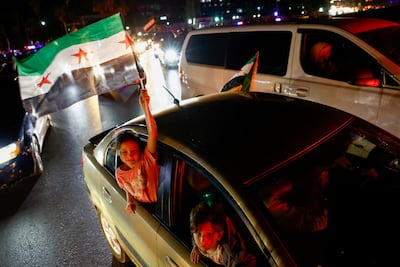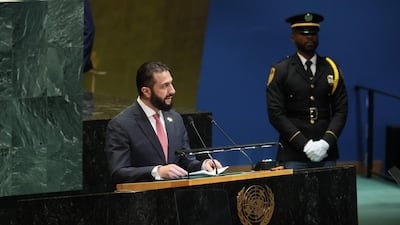The UN Security Council is considering a draft resolution that would ease long-standing sanctions on Syrian officials and restore international dealings with its government, in the most significant shift in policy towards Damascus in more than a decade.
The US-drafted resolution was circulated among the Council’s 15 members on October 9. It would allow the flow of financial assets, funds and economic resources to Syria’s central government.
The text, seen by The National, underscores the tension at the heart of the international community’s Syria policy: how to re-engage a government once ostracised for its brutality while keeping pressure on armed groups still considered to be terrorist organisations.
The draft stresses that member states, including Syria, must continue to “prevent and suppress terrorist acts committed specifically by ISIS and all other individuals, groups, undertakings and entities associated with Al Qaeda or ISIS,” while ensuring that no Syrian actor provides support to such groups.
If adopted, the measure would also relax limits on arms transfers, allowing under UN supervision the provision of equipment and technical expertise for narrowly defined purposes, including chemical weapons disposal, nuclear protection and demining operations, which diplomats say are essential for rebuilding infrastructure and enabling displaced Syrians to return home.
It also calls for delisting President Ahmad Al Shara and his Interior Minister, Anas Khattab, from the UN’s sanctions list “effective as of the date" of the resolution.
According to a UN diplomat, China has indicated it is comfortable with the proposed delistings, in a rare moment of consensus among the five permanent members on the Security Council.
Even so, Hayat Tahrir Al Sham, the dissolved militant faction that forms the backbone of Mr Al Shara’s government, would remain under UN sanctions.
HTS traces its origins to Jabhat Al Nusra, Al Qaeda’s former Syrian affiliate that rebranded itself in 2017 in an effort to shed its extremist image.
Acting under Chapter 7 of the UN Charter, the draft “decides” that the asset freeze imposed under previous counter-terrorism resolutions would no longer apply to funds or economic resources provided to the Syrian government.
It urges states and institutions to take steps to ensure that any money or assets do not benefit people or entities still listed under the UN’s ISIS and Al Qaeda sanctions regime.
Maya Ungar, a UN analyst at the International Crisis Group, said the resolution contains two provisions that could be decisive for Syria’s recovery and reconstruction.
“The first is a clarification that asset freezes no longer apply to the Syrian government, even if sanctioned individuals are part of it,” Ms Ungar told The National.
“It’s meant to reassure risk-averse financial institutions and encourage investment. Still, many banks are likely to remain cautious, since sanctions on HTS as an organisation would remain in place even if Mr Al Shara and Mr Khattab are delisted.”
The second element, added Ms Ungar, involves a limited easing of the arms embargo to allow UN nuclear and chemical weapons agencies – as well as mine-action services – to operate more effectively in Syria. “This clarification is intended to make reconstruction and development a smoother process,” she said.
if you go
UAE currency: the story behind the money in your pockets
Navdeep Suri, India's Ambassador to the UAE
There has been a longstanding need from the Indian community to have a religious premises where they can practise their beliefs. Currently there is a very, very small temple in Bur Dubai and the community has outgrown this. So this will be a major temple and open to all denominations and a place should reflect India’s diversity.
It fits so well into the UAE’s own commitment to tolerance and pluralism and coming in the year of tolerance gives it that extra dimension.
What we will see on April 20 is the foundation ceremony and we expect a pretty broad cross section of the Indian community to be present, both from the UAE and abroad. The Hindu group that is building the temple will have their holiest leader attending – and we expect very senior representation from the leadership of the UAE.
When the designs were taken to the leadership, there were two clear options. There was a New Jersey model with a rectangular structure with the temple recessed inside so it was not too visible from the outside and another was the Neasden temple in London with the spires in its classical shape. And they said: look we said we wanted a temple so it should look like a temple. So this should be a classical style temple in all its glory.
It is beautifully located - 30 minutes outside of Abu Dhabi and barely 45 minutes to Dubai so it serves the needs of both communities.
This is going to be the big temple where I expect people to come from across the country at major festivals and occasions.
It is hugely important – it will take a couple of years to complete given the scale. It is going to be remarkable and will contribute something not just to the landscape in terms of visual architecture but also to the ethos. Here will be a real representation of UAE’s pluralism.
The biog
Family: He is the youngest of five brothers, of whom two are dentists.
Celebrities he worked on: Fabio Canavaro, Lojain Omran, RedOne, Saber Al Rabai.
Where he works: Liberty Dental Clinic
UAE v Gibraltar
What: International friendly
When: 7pm kick off
Where: Rugby Park, Dubai Sports City
Admission: Free
Online: The match will be broadcast live on Dubai Exiles’ Facebook page
UAE squad: Lucas Waddington (Dubai Exiles), Gio Fourie (Exiles), Craig Nutt (Abu Dhabi Harlequins), Phil Brady (Harlequins), Daniel Perry (Dubai Hurricanes), Esekaia Dranibota (Harlequins), Matt Mills (Exiles), Jaen Botes (Exiles), Kristian Stinson (Exiles), Murray Reason (Abu Dhabi Saracens), Dave Knight (Hurricanes), Ross Samson (Jebel Ali Dragons), DuRandt Gerber (Exiles), Saki Naisau (Dragons), Andrew Powell (Hurricanes), Emosi Vacanau (Harlequins), Niko Volavola (Dragons), Matt Richards (Dragons), Luke Stevenson (Harlequins), Josh Ives (Dubai Sports City Eagles), Sean Stevens (Saracens), Thinus Steyn (Exiles)
Pathaan
%3Cp%3E%3Cstrong%3EDirector%3A%3C%2Fstrong%3E%20Siddharth%20Anand%C2%A0%3C%2Fp%3E%0A%3Cp%3E%3Cstrong%3EStars%3A%3C%2Fstrong%3E%20Shah%20Rukh%20Khan%2C%20Deepika%20Padukone%2C%20John%20Abraham%C2%A0%3C%2Fp%3E%0A%3Cp%3E%3Cstrong%3ERating%3A%3C%2Fstrong%3E%203%2F5%3C%2Fp%3E%0A
UAE currency: the story behind the money in your pockets
Global state-owned investor ranking by size
|
1.
|
United States
|
|
2.
|
China
|
|
3.
|
UAE
|
|
4.
|
Japan
|
|
5
|
Norway
|
|
6.
|
Canada
|
|
7.
|
Singapore
|
|
8.
|
Australia
|
|
9.
|
Saudi Arabia
|
|
10.
|
South Korea
|
Winners
Ballon d’Or (Men’s)
Ousmane Dembélé (Paris Saint-Germain / France)
Ballon d’Or Féminin (Women’s)
Aitana Bonmatí (Barcelona / Spain)
Kopa Trophy (Best player under 21 – Men’s)
Lamine Yamal (Barcelona / Spain)
Best Young Women’s Player
Vicky López (Barcelona / Spain)
Yashin Trophy (Best Goalkeeper – Men’s)
Gianluigi Donnarumma (Paris Saint-Germain and Manchester City / Italy)
Best Women’s Goalkeeper
Hannah Hampton (England / Aston Villa and Chelsea)
Men’s Coach of the Year
Luis Enrique (Paris Saint-Germain)
Women’s Coach of the Year
Sarina Wiegman (England)
Killing of Qassem Suleimani
More from Neighbourhood Watch:
More on animal trafficking



